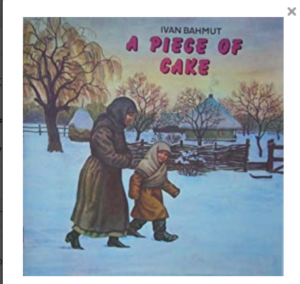
During Diwali vacations this winter, I found in my old library, the book I had so much cherished as a child. It was the story, my father read out to me when I would be tucked in bed or laze on the drawing room sofa, or simply when I demanded.
A Ukrainian folk tale, the book belongs to one of my brilliant memories of story listening experience from my parents, when I was a child and it is a treasure, I would forever behold.
The book ‘A Piece of Cake’ written by Ivan Bahmut, is a story (that runs in flashback), of a little boy named Mikolko, who is happy to be invited over for a dinner party at his Aunt’s. He’s happy also because he gets to wear his father’s shoes. His own, are torn. Mother instructs him to behave gentlemanly and not to gorge on the food Aunt Kalyan serves to him, as they are poor and might be made fun of by the arrogant Aunt; a point which the innocent Mikolko does not completely fathom.
Going by his mother’s instructions, when finally, the children are served dessert – a cake, Mikolko takes only a piece when insisted. When he tries to have a second helping, mother catches him in the act and so does his Aunt. To save his mother the embarrassment, he makes an excuse, that it was the cat he was feeding the cake to! When Aunty tries to humiliate him further by saying how could a cat eat a cake, her jovial son snatches the cake from Mikolko’s hand and feeds it to the cat, who relishes it like anything.
The Aunt stands sullen faced and openly shows disregard for Mikolko and his father, calling him a thief, while Mikolko’s mother cries tears of pride and love on the pleasurable discovery of his son’s mature understanding.
The description of mother’s fear of humiliation and being called out for her poverty, earlier in the story and during the dinner party are natural, real, touchy, naïve and painful.
The book although mentioned in the Goodreads, does not have much literature about either the story or the author. This is unfortunate, because the folklore shows us how children interpret the essential emotions and feelings, like embarrassment and pride, reflected through their parents’ non-verbal expressions, instead of directly experiencing them.
